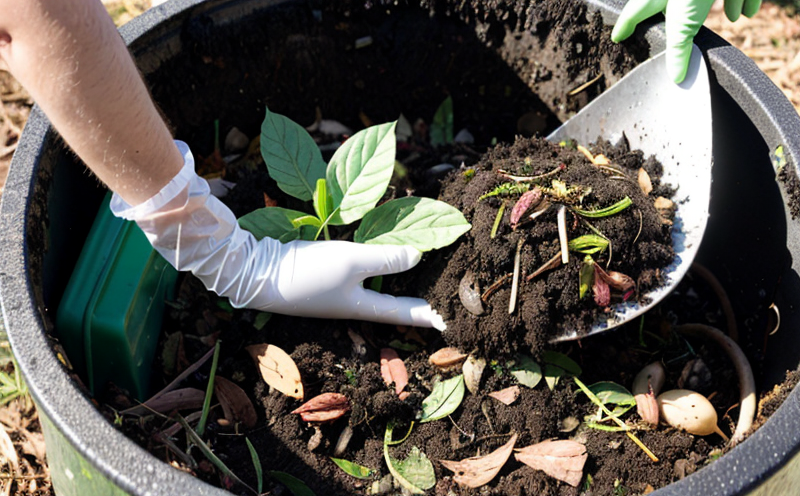OECD 311 Anaerobic Biodegradability Testing in Waste
The OECD 311 anaerobic biodegradability test is a critical procedure used to assess the environmental impact of waste materials, particularly those intended for composting or other forms of sustainable disposal. This test evaluates whether organic compounds within a given waste material can be broken down by microorganisms under anaerobic (oxygen-free) conditions, which simulate real-world landfill environments.
Understanding biodegradability is essential in the waste management sector as it helps determine if a waste product will decompose into harmless substances without contributing to methane emissions or other harmful environmental effects. This test is especially important for the development and certification of compostable plastics and organic materials that are designed to be safely returned to nature through decomposition.
The OECD 311 protocol involves incubating samples in an anaerobic environment with a specific microbial consortium, typically consisting of Clostridium sporogenes and other obligate anaerobes. The test measures the amount of carbon dioxide produced by these microorganisms as they degrade the organic compounds over a set period. This process is crucial for ensuring that waste materials do not persist in landfills, thereby reducing environmental pollution.
The test is governed by the Organization for Economic Co-operation and Development (OECD) guidelines, which provide standardized methods to ensure consistency across laboratories worldwide. Compliance with these guidelines ensures accurate results, enabling stakeholders to make informed decisions regarding waste management practices.
Real-world applications of this test include assessing the biodegradability of compostable packaging materials, agricultural amendments like manure-based products, and other organic wastes destined for recycling or composting processes. By ensuring that these materials meet strict biodegradability standards, industries can contribute significantly to sustainable waste management practices.
The OECD 311 test is particularly relevant in sectors such as agriculture, food processing, and packaging manufacturing where the environmental impact of waste products is a key concern. It helps manufacturers develop more eco-friendly products by providing data on how effectively their materials will decompose under controlled conditions. This information is vital for regulatory compliance and can also enhance brand reputation through demonstrated commitment to sustainability.
Sample preparation for this test involves careful selection and weighing of the waste material, followed by dilution and inoculation with a standardized microbial consortium. The samples are then incubated in sealed containers to maintain anaerobic conditions throughout the testing period. Regular monitoring allows researchers to track the rate at which carbon dioxide is produced as an indicator of biodegradation.
The instrumentation used for this test typically includes gas collection systems and automated data recording devices capable of measuring changes in CO2 levels over time. These tools provide precise measurements that are essential for accurate analysis. The results from this test are reported in terms of the percentage of carbon dioxide produced relative to the initial amount present, providing a clear measure of biodegradability.
Understanding and implementing the OECD 311 anaerobic biodegradability test is crucial for any organization involved in waste management or product development aimed at sustainability. It offers valuable insights into how different materials behave under real-world conditions, helping to drive more environmentally friendly practices across industries.
Why It Matters
The OECD 311 anaerobic biodegradability test is of paramount importance in the waste management and composting industries as it provides a standardized method for assessing how quickly and completely organic compounds within waste materials can be broken down by microorganisms. This information is crucial for several reasons:
- Environmental Impact Reduction: By ensuring that waste products biodegrade efficiently, this test helps reduce the risk of persistent pollutants in landfills, thus minimizing environmental degradation.
- Sustainability Compliance: Many countries and regions have stringent regulations regarding the disposal of organic materials. Meeting these requirements through rigorous testing ensures compliance with local laws and policies.
- Innovation in Product Development: For manufacturers developing new compostable products, this test offers valuable data on material performance under anaerobic conditions, enabling continuous improvement and innovation.
- Risk Mitigation for Landfill Management: Understanding the biodegradability of waste materials allows landfill operators to manage their sites more effectively, reducing risks associated with improper decomposition processes.
In summary, the OECD 311 test plays a vital role in promoting sustainable waste management practices by providing essential data on how different materials behave under controlled conditions. This knowledge is indispensable for both regulatory compliance and product development, ensuring that industries can contribute positively to environmental conservation efforts.
Why Choose This Test
The OECD 311 anaerobic biodegradability test is an indispensable tool in the waste management sector, offering unparalleled insights into how different materials behave under controlled conditions. Here are several compelling reasons why choosing this test is advantageous:
- Standardization: The OECD guidelines ensure that tests conducted by various laboratories worldwide produce consistent and reliable results.
- Regulatory Compliance: Meeting specific biodegradability standards helps organizations adhere to local regulations, avoiding potential legal penalties and reputational damage.
- Innovation Support: By providing detailed data on material performance, this test supports ongoing research and development efforts aimed at creating more sustainable products.
- Ethical Considerations: Ensuring that waste materials decompose safely and effectively aligns with ethical standards in product design and production.
- Customer Confidence: Demonstrating compliance with recognized international standards can enhance customer trust, potentially leading to increased market share.
In conclusion, the OECD 311 anaerobic biodegradability test is not just a technical procedure but a strategic tool that supports sustainable practices across industries. By choosing this test, organizations invest in long-term environmental stewardship and operational efficiency.





